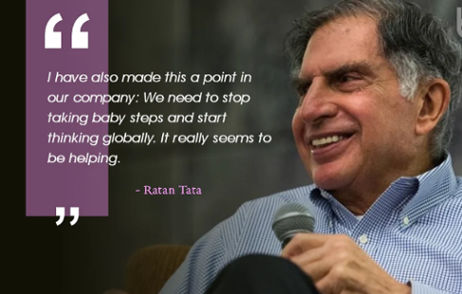Early Life and Introduction to Tata Group
Ratan Tata was born in Navsari, India, on December 28, 1937, into the prominent Tata family, known for its industrial legacy. He attended the Cathedral and John Connon School in Mumbai and later pursued his architecture and structural engineering education at Cornell University in the United States.
After returning to India in 1962, Ratan Tata joined Tata Group, starting his career at Tata Steel, where he gained hands-on experience in various aspects of the business. His initial roles involved working on the shop floor, which helped him understand the operational intricacies of the company. In 1991, he took over as chairman of Tata Group, inheriting a legacy of innovation and integrity. His leadership marked the beginning of a transformative era for the conglomerate, driving modernization and global expansion while maintaining the core values established by his predecessors.
Leadership and Modernization of Tata Group
Ratan Tata‘s leadership from 1991 to 2012 transformed the Tata Group into a global powerhouse through strategic modernization and innovation. Key elements of his tenure include:
- Strategic Restructuring: he streamlined operations and aligned diverse businesses under a cohesive strategy to enhance efficiency and competitiveness.
- Diversification and Innovation: He expanded the group’s portfolio into new industries like IT and telecommunications, fostering a culture of innovation and investment in research and development.
- Global Expansion: Tata Group’s international presence grew significantly under his leadership, which was highlighted by key acquisitions such as Jaguar Land Rover and Corus Steel.
- Focus on Quality and Excellence: He emphasized high standards and continuous improvement, positioning Tata products and services as benchmarks in various sectors.
- Corporate Social Responsibility: He integrated CSR into the business strategy, ensuring that the group contributed to societal development through initiatives in education, healthcare, and community support.
- Leadership Development: He prioritized nurturing talent, and fostering a culture of mentorship and learning to prepare future leaders for upholding Tata’s values.
- Technological Advancement: He embraced technological innovation, particularly through Tata Consultancy Services (TCS), positioning the group as a leader in IT services.
His leadership modernized the Tata Group, reinforcing its global standing while upholding its foundational values of integrity and social responsibility. His strategic vision and commitment to excellence have left a lasting legacy in Indian industry.
Expansion Beyond India: Global Acquisitions and Growth
Under Ratan Tata‘s leadership, Tata Group significantly expanded its global footprint, transforming from a primarily Indian conglomerate into a formidable player on the international stage. His strategic vision focused on diversification, innovation, and strengthening Tata’s global presence through key acquisitions and organic growth.
- Jaguar Land Rover (2008): One of the most notable acquisitions was the purchase of Jaguar Land Rover from Ford. At a time when both brands were facing challenges, Ratan Tata saw their potential for revival. Under Tata’s leadership, Jaguar Land Rover not only regained its reputation but also achieved profitability, contributing significantly to Tata Motors’ growth and enhancing its global prestige.
- Corus Steel (2007): Tata Steel’s acquisition of Corus Group marked a significant milestone, making Tata Steel one of the largest steel producers globally. This $12 billion acquisition was a bold move that positioned Tata Steel as a major player in the international steel market, emphasizing Tata’s commitment to growth through strategic investments.
- Tetley Tea (2000): The acquisition of Tetley Tea was an early example of Tata’s global ambitions. By acquiring this British tea company, Tata Tea (now Tata Global Beverages) became one of the largest tea brands worldwide, showcasing the group’s ability to diversify and innovate in the consumer goods sector.
- Tata Consultancy Services (TCS): Under him, TCS grew into a global leader in IT services, with significant contributions to the outsourcing industry. TCS’s expansion into international markets, particularly in North America and Europe, helped establish India as a hub for IT and software services.
- Strategic Partnerships and Ventures: Beyond acquisitions, he encouraged collaborations and partnerships with international firms, facilitating technology transfer and enhancing operational efficiencies. This approach not only expanded Tata’s global reach but also fostered innovation within the group.
- Focus on Ethical Practices: Throughout these expansions, he maintained a strong commitment to ethical business practices and corporate social responsibility. He emphasized the importance of upholding Tata’s values in all international ventures, ensuring that global growth did not come at the expense of integrity or social impact.
Ratan Tata’s vision for global expansion transformed the Tata Group into a diverse and respected multinational corporation. His strategic acquisitions and emphasis on ethical practices have set a benchmark for Indian companies seeking to establish themselves on the world stage, reflecting the potential for Indian businesses to thrive globally while maintaining a commitment to social responsibility.

Ethics and Corporate Responsibility Under Ratan Tata
Under Ratan Tata’s leadership, ethics and corporate responsibility became central to the Tata Group’s identity. His commitment to integrity and transparency fostered trust among stakeholders and reinforced the company’s reputation. Ratan Tata championed corporate social responsibility (CSR), with initiatives focused on education, healthcare, and rural development through the Tata Trusts, reflecting a dedication to societal well-being.
He prioritized sustainability, promoted environmentally responsible practices across various sectors, and emphasized employee welfare by advocating fair labor practices and opportunities for growth. Community engagement was also crucial, with Tata companies supporting local communities to ensure mutual development. Ratan Tata’s ethical leadership style, characterized by humility and accountability, set a strong example within the organization. Overall, his focus on ethics and corporate responsibility established a benchmark for corporate governance in India, demonstrating that business success can align with social impact.
Ratan Tata’s Contribution to Indian Industry
Ratan Tata‘s contribution to Indian industry is transformative, shaping the nation’s business landscape and global presence. Under his leadership, the Tata Group expanded into multiple sectors, including steel, automotive, IT, and telecommunications. He spearheaded the launch of Tata Consultancy Services (TCS), making India a global leader in IT services, and Tata Motors, which introduced the Tata Indica and Tata Nano, pioneering affordable cars for Indians.
His visionary global acquisitions, such as Jaguar Land Rover and Corus Steel, showcased Indian companies on the world stage. His commitment to ethical business practices, innovation, and corporate social responsibility elevated Tata Group’s reputation, contributing immensely to India’s industrial and economic growth. His focus on sustainable development and philanthropy also set new benchmarks for corporate governance in India.
Innovation and Vision for the Future
Ratan Tata’s innovation and vision for the future are rooted in creating impactful, socially responsible businesses while driving global growth. He emphasized affordable innovation, exemplified by the Tata Nano, aiming to make quality products accessible to the masses. His leadership guided Tata Group’s global expansion, acquiring major brands like Jaguar Land Rover while staying true to Indian values.
Tata prioritized sustainability, promoting environmentally conscious growth and technological advancement, particularly through Tata Consultancy Services (TCS), making India a leader in IT services. Even post-retirement, he champions startups and disruptive innovations in sectors like e-commerce, healthcare, and renewable energy.
Overall, Ratan Tata’s vision combines profitability with a strong commitment to social impact, focusing on innovations that improve lives while driving economic progress.
Philanthropy and Social Impact
Ratan Tata’s social impact extends far beyond his business successes, leaving a lasting mark on communities worldwide. Through the Tata Trusts and Tata Group’s CSR initiatives, he championed causes such as education, healthcare, rural development, and environmental sustainability. Tata’s focus on improving access to quality education helped uplift marginalized sections of society, while initiatives in healthcare have provided critical infrastructure and services to underserved regions. His leadership emphasized corporate responsibility, ensuring that Tata companies contributed to societal well-being rather than just profit.
Globally, Ratan Tata is recognized for his philanthropic work, which includes major donations to institutions like Harvard Business School and Cornell University, along with various social programs. His legacy of combining business with ethical values and social upliftment has set a new standard for corporate citizenship, inspiring leaders around the world to pursue purpose alongside profit.
Conclusion: A Global Indian Icon
Ratan Tata’s journey is a testament to visionary leadership, resilience, and unwavering commitment to ethical business practices. Under his stewardship, Tata Group became a global conglomerate and an emblem of integrity and social responsibility. His influence extended far beyond business; Ratan Tata redefined what it means to be a leader in India’s corporate world while making significant strides on the global stage. Today, he is an enduring symbol of humility, innovation, and service to society. Ratan Tata’s legacy inspires future generations, affirming his place as a truly global Indian icon.
– RIYA SINGH
MUST READ: HORROR OF THE PAST REVISITED: HATHRAS HUMAN SACRIFICE OF CLASS 2 BOY EXPOSES DARK LEGACY


